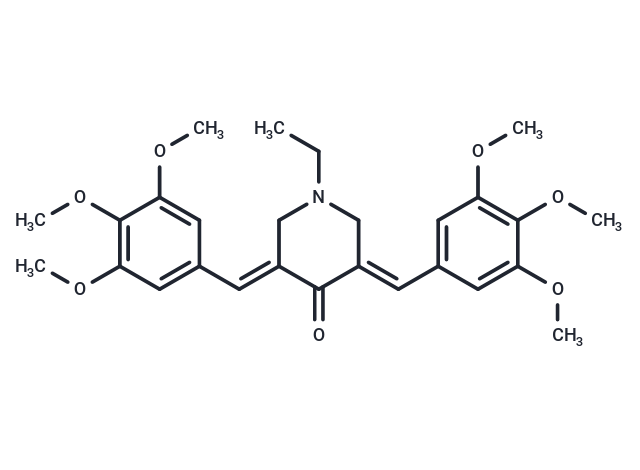Shopping Cart
- Remove All
 Your shopping cart is currently empty
Your shopping cart is currently empty

L48H37 is a chemically stable analog of Curcumin. It exhibits potent inhibitory properties against myeloid differentiation protein 2 (MD2), acting as a specific inhibitor. Its mechanism involves inhibiting the interaction and signaling transduction of LPS-TLR4/MD2. L48H37 is primarily utilized in sepsis and lung injury research [1].

| Pack Size | Price | Availability | Quantity |
|---|---|---|---|
| 2 mg | $39 | In Stock | |
| 5 mg | $64 | In Stock | |
| 10 mg | $97 | In Stock | |
| 25 mg | $197 | In Stock | |
| 50 mg | $313 | In Stock | |
| 100 mg | $513 | In Stock | |
| 500 mg | $1,090 | In Stock | |
| 1 mL x 10 mM (in DMSO) | $79 | In Stock |
| Description | L48H37 is a chemically stable analog of Curcumin. It exhibits potent inhibitory properties against myeloid differentiation protein 2 (MD2), acting as a specific inhibitor. Its mechanism involves inhibiting the interaction and signaling transduction of LPS-TLR4/MD2. L48H37 is primarily utilized in sepsis and lung injury research [1]. |
| In vitro | L48H37 effectively suppresses LPS-induced inflammation in mouse macrophages, particularly diminishing TNF-α and IL-6 production and gene expression [1]. It also demonstrates noteworthy anticancer activity by reducing the viability of A549 and H460 lung cancer cells with IC50 values of 5.3 μM and 2.3 μM, respectively, outperforming curcumin. Importantly, its cytotoxicity towards normal human lung epithelial cells (BEAS-2B) remains low, with an IC50 of 21 μM [2]. Moreover, L48H37 at concentrations of 1, 2, or 4 μM over 16 hours decreases p-Cdc2 and Cdc2 levels, increases p53, enhances cleaved poly (ADP-ribosyl) polymerase (PARP) levels, and reduces anti-apoptotic protein Bcl-2 expression in both H460 and A549 cells, indicating apoptosis induction. Additionally, at 4 μM for 16 hours, L48H37 dose-dependently elevates intracellular ROS levels, as evidenced by increased DCF levels in these cells [2]. Cell viability assays and Western Blot analysis confirm its concentration-dependent efficacy in inhibiting lung cancer cell growth and modulating key proteins involved in cell cycle and apoptosis [2]. |
| In vivo | L48H37, administered via intraperitoneal injection at doses of 5 mg or 10 mg/kg once daily for 11 days, effectively inhibits the growth of H460 xenograft tumors and demonstrates significant anti-tumor effects in mice. This study utilized 5-week-old athymic BALB/cA nu/nu female mice weighing 18-22 g. The treatment resulted in reduced tumor wet weights compared to the control group, decreased levels of phosphorylated STAT3, and increased levels of phosphorylated EIF2α and ATF4, indicating a potent anti-tumor response without causing significant structural alterations in the mice. |
| Molecular Weight | 483.55 |
| Formula | C27H33NO7 |
| Cas No. | 343307-76-6 |
| Smiles | CCN1C\C(=C/c2cc(OC)c(OC)c(OC)c2)C(=O)\C(C1)=C\c1cc(OC)c(OC)c(OC)c1 |
| Storage | Powder: -20°C for 3 years | In solvent: -80°C for 1 year | Shipping with blue ice. | ||||||||||||||||||||||||||||||
| Solubility Information | DMSO: 45 mg/mL (93.06 mM), Sonication is recommended. | ||||||||||||||||||||||||||||||
Solution Preparation Table | |||||||||||||||||||||||||||||||
DMSO
| |||||||||||||||||||||||||||||||

Copyright © 2015-2025 TargetMol Chemicals Inc. All Rights Reserved.